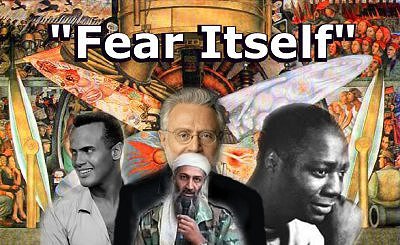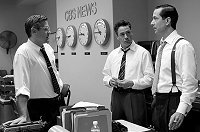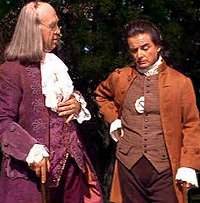Saturday, January 28, 2006

Belafonte, Blitzer, binLaden and Canada Lee before Diego Rivera's Man at the Crossroads
This past week I mentioned the unfortunate use made of Harry Belafonte on last Sunday’s Meet The Press.
On Monday, Wolfe Blitzer, in the second of what appeared to be a mainstream media one-two punch, tried, via a live shot on his busy studio wall, to further smear Mr. Belafonte as a terrorist-sympathizing extremist and, by extension, any Bush critical Democrat:
BLITZER: Are you saying that President Bush is worse than Osama bin Laden?
BELAFONTE: I'm saying that he's no better. You know, it's hard to make a hyperbole stick. I obviously haven't had a chance to meet all the terrorists in the world, so I have no reason to throw around the words like the greatest or make some qualitative statement. I do believe he is a terrorist.
-snip-
BLITZER: …Worse than al Qaeda? Is that what you're saying?
BELAFONTE: Well, I don't want to make those kind of comparisons. I'm not too sure all of what al Qaeda has done. Al Qaeda tortures. We torture. Al Qaeda's killed innocent people. We kill innocent people. Where do the lines get blurred here?
-snip-
BLITZER: …The U.S., when it goes after terrorists, there may be what's called collateral damage…Do you understand the difference?
BELAFONTE: I understand the difference. What I don't want to get stuck with, or be guided by, is what you call collateral damage. That does not cleanse us morally.
-snip-
BLITZER: …When you get involved in name-calling…isn't that crossing the line?
BELAFONTE: Not at all…You know, one of the big problems that we have in this country is the inability to be honest and to be straightforward…We've never had a dialogue in this country on the real issues of slavery. I don't even want to get stuck there. But what I said about Colin Powell is that he serves his master well…and I stand by it…He stood before the United Nations and lied and knew he was lying. I mean, where do we draw these lines here?
BLITZER: How do you know Colin Powell knew he was lying…there's a difference between misspeaking and lying.
BELAFONTE: Mr. Blitzer, you have access to a lot of information. More than once we've discussed the fact that Colin Powell went before his president, went before others and said, "I can't say this. It is not correct. There are things about it that touch me deeply and disturb me." And all of a sudden there he was in front of the U.N., despite this disclaimer, doing what he did.
-snip-
BLITZER: I see you're not backing away from one word of what you said.
BELAFONTE: No, I can't. Dr. King is my mentor and I believe in truth, and that's what I'm doing.
Belafonte, talking with Wolfe but also reacting to Russert, was relaxed, beautifully well spoken and artfully blunted the paid-media’s poison-tipped arrows.
Of course, Mr. Belafonte previously toured a similar government-inspired shadow land of unsupported fear in the years following World War II.
The birth of the electronic media that is presently smothering the American public with cottony "truthiness" was as ugly and messy as today's current media-death rattle.
Pinko's and fellow travelers, a government-identified and undefined menace, stalked the fear-hyped land.
A blacklist was developed to enumerate, at first, some of the “radical writers” involved with Hollywood’s movies.
The Blacklist, in short order a hot public catch-phrase, expanded to include television writers and performers under the cruel rubric “pinkos”; a list identified only by the unsubstantiated whispers gathered by agents of J. Edgar Hoover.
Politicians used and exploited the fear and lives of ordinary people were horribly changed forever.

“Known leftist”, as cable news might call him, George Clooney explored these issues from CBS’ perspective in 2005’s excellent “Goodnight and Good Luck”.
Another “known leftist” Tim Robbins fleshes out the cultural milieu with 1999’s very entertaining Cradle Will Rock.
The superb documentary Scandalize My Name, now appearing infrequently on the cable channel Ovation, documents the horrors visited upon America’s black entertainers and writers who, after the pinko smoke cleared, seemed more concerned with correcting the slave dialects and stereotypical roles dominating the TV and movies of the day.
My only exposure to a blacklisted actor came in 1974 or ’75 when I was 20 or 21 years old.
At the time I was working at WLWT but still traveling back to my first TV employer WCET to finish up various projects in their fabulous and gigantic new studio.
One summer day, I was sweeping that studio’s vast floor and awaiting the arrival of someone scheduled for a taping, when in walked a friend from the publicity department with an older gentleman who looked extremely familiar.
I put aside the broom and shook the gentleman’s hand as Marilyn, the PR person, introduced me as the director.
I could instantly tell that both the broom and myself had made a large impression on this nigglingly familiar older man.
Marilyn introduced him as Howard da Silva and I instantly both knew of him and greatly liked this kindly man with sparkling eyes who had recently appeared as Benjamin Franklin in the 1972-released movie of the musical 1776.

Da Silva and Willian Daniels as John Adams in 1776
In the course of our excited conversation, I unintentionally impressed Mr. da Silva, yet again, by asking about his experiences as a blacklisted actor...a topic that had facinated my mother and, thanks to her stories, occupied a portion of my childhood thoughts and teenaged reading.
As the taping progressed and as the happy chatter between myself and the steelworker turned actor continued, I suddenly, with that unbridled exuberance that only happens to the young and innocent, blurted out a thought…Wouldn’t it be terrific to have Mr. da Silva record a pledge break as Benjamin Franklin?
Da Silva, with an equal measure of youthful glee said, “I’ve have the full costume at the hotel. Let’s do it!”
The very next day, at a time we had predetermined, the lobby receptionist called to say that Ambassador Franklin had arrived.
I walked to the lobby and was in the presence of Ben Franklin.
From ostrich-trimmed tricorn hat to silver-buckled shoes, Mr. da Sliva appeared exactly as in the movie and as shown in the accompanying photograph; he did not break character.
I kid you not when I say this golden day remains one of my most treasured memories.
In a manner keeping with this Founder’s rank, I escorted Ambassador Franklin to an unscheduled meeting with a very surprised President and General Manager before our arrival in the studio.
The taping, we called the spot a Bicentennial Minute with Ben Franklin, was a joy and I only wish I had been blessed with another chance to again experience or work with this wonderful, kind and generous man.
Mr. da Silva passed away on February 16, 1986.
I still think of him, his kindness to me and the effects of the blacklist he personally witnessed.
Harry Belafonte's bravery, this week, again thrust these memories of Mr. da Silva, the blacklist and words intended to harm and mischaracterize back into the forefront of my thoughts.
Images: CNN, Diego-Rivera.org, Google, LolitaBlue.com, Melinda Sue Gordon, Schoolnet.co,uk

